|
|
| From the beginning, Didsbury worked closely with Richard Basehart as his stand-in. "The nature of my job was to watch Richard when he was acting and then, when they called second team, and he'd retired to his dressing room, I would have to go through his motions for the lighting." Expressed in greater detail, "It is the stand-in's job to observe the actor he is covering during rehearsal. We go through all of the moves that the actor did, working with the lighting director and the cameraman. A good stand-in can make the cameraman's and lighting director's jobs a lot easier, but they (the stand-ins) have to watch all of the actors in the scene carefully and remember their moves precisely. I had to watch all of the actors, not just Richard, because the cameraman and director were often discussing other things during part of the rehearsal, and most stand-ins are not all that experienced and miss many of the moves. On three-camera shows, those that shoot with an audience, the whole show is blocked by the actor, so the stand-in has to go in and do about 24 minutes of moves. I only worked a three-camera show once; it was a wonderful challenge." |
|
Ray Didsbury in makeup |
Didsbury wore a variety of hats. When he wasn't acting as Richard Basehart's stand-in, he was fulfilling duties as an ongoing extra or tending to voice talent chores. As he notes, "When he wasn't working, I was needed as the dialogue coach on the set. So there wasn't too much time to socialize. We did lunch together about once a week (he always picked up the tab). Talk was usually about his son, the new baby, some gossip or his opinion of the director or a guest star. Sometimes he even gave me pointers on good acting. The one I remember best was do not demonstrate. I'm not even sure I know what he meant, but here's a guess: Don't act...let the scene move you, let the dialogue motivate you. Don't wave your arms, roll your eyes, get physical for no reason. Just do as we do in everyday conversation. Let the moment happen. I hope that doesn't sound too Stanislavsky and Method. |
| When pressed for observations on Richard Basehart, Ray Didsbury is refreshingly candid, but always respectful. He is quick to point out that it has been many years since the two worked together. When prodded for comments about Basehart the man, Didsbury said, "I'm not really sure I can help you....I feel that he was unhappy, not with his marriage or children--I am not sure what it would be about other than career, even though he never said as much. I often had the feeling that he was tired or bored with things, but remember, these are only guesses, he never said any of this. I do know that he would go to bat for the underdog....he really seemed to enjoy doing that, he had occasion to do it for me twice, and he was gentle in one case as he liked the man he was chastisiing; the second time he was fierce, as he did not respect that person." | 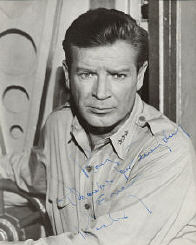
|
|
The above observations seem reasonable, in that Basehart was an extraordinarily talented man, and the fact is Voyage did degenerate into an incredibly puerile vehicle in later years. It is easy to see how this may have led to a certain sadness on the part of the man who headed the cast -- a certain disappointment at seeing all the years and talent he'd put into the work ending on a less-than-stellar note. To his credit, no matter how bad the scripts got, Basehart hung in and performed--because he had talent, and I propose, just too much heart to quit trying. |
|
From the
perspective of
having worked with cast members every day for four years, Ray Didsbury
reflects on Voyage's other cast regulars as
well
... |
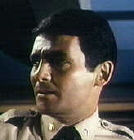 |
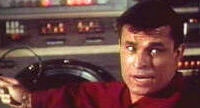 |
Del Monroe: "Del was a sweet, kind, thoughtful young man who was so happy to be working and was always prepared and willing to do more than his part to make a scene work." As Didsbury remarked in the Mark Phillips interview, "He was a gung-ho, young actor who was very capable . . . an all around nice guy with no pretenses." |
|
Robert Dowdell had the thankless task of repeating Captain Cranes orders on each weeks show and in addition--looking grim. As Didsbury puts it: "Bob Dowdell......a pussy cat...nice guy, made no waves but should have. He just rolled with the punches and accepted his lack of being used to his fullest potential. He was, I suspect a good actor but was never really given the chance." |
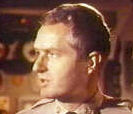 |
 |
Terry Becker: "Terry was a good actor, but he was also insecure. He was not a bit player but at the same time, he was not a star. He wanted the same respect that David and Richard got. He drove me nuts with constantly running his lines even when he knew them backward and forward." Becker went on to direct and is now involved in a family business |
|
Paul Trinka: "....A young actor who was not under contract for all of the shows, so he worked occasionally. He was quiet and withdrawn. Never had a chair with his name on it and I did....suspect that this bothered him so one day he asked the prop man to make up a chair with his name on it, they did. And then coincidentally he did not work on the next few shows. It became a joke about being careful of what you ask for." |
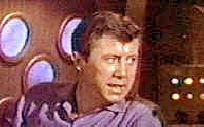 |
 |
Richard Bull.....I liked this man, he was a bit older than all except Richard (at least he appeared to be in manner and manners). He was always prepared, appreciative of any help he was given in the scene and just an all around professional....I ran into him years later when visiting the "Dr. Quinn" set and he was most kind. |
|
As a Voyage extra, Didsbury was often at Seaview's helm in the show's first season, and he eventually won a regular position as crewman Ray. "We were what today would be called a repertory company of extras. Being a show where the same faces could appear weekly, and the fact that it was a 'money show', everybody wanted to work it. They all more or less hung out in any set that was not being used, playing cards, reading, sleeping or on the phone . . . this being before the days of cell phones, they would be off the set making their calls." |
|
| Early on, Didsbury fell into the position of coordinating the other extras. Because of health problems, "one of the assistant directors preferred to sit at his desk on the stage all day and not become involved with the running of the set and assisting the first assistant director, and that's where the opportunity presented itself. I did lots of the minutiae of his job and was rewarded financially." |
|
|